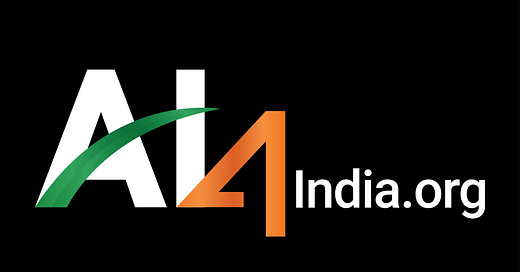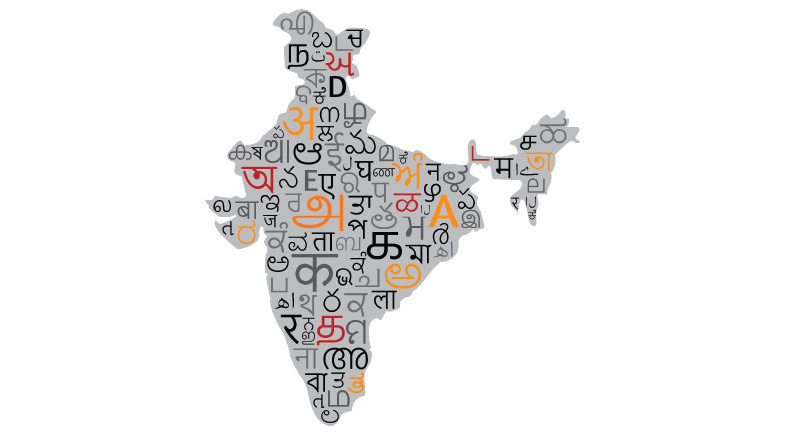Building India’s AI Stack: The Role of Creativity, Regulation, and Innovation
The AI4India Weekly #45
This week, we explore the evolving role of AI and human creativity, with Shashi Shekhar Vempati emphasizing why human oversight remains critical in AI-generated content. As India accelerates its AI journey, experts like Krishnan Narayanan and Balaraman Ravindran highlight the importance of developing indigenous AI models tailored to India's diverse needs. Meanwhile, Union Minister Ashwini Vaishnaw lays out India's vision to transition from a service-driven economy to a product innovation powerhouse, stressing the need for greater collaboration between startups, academia, and industry. We also take a deep dive into Model Context Protocol (MCP) and its role in shaping AI governance. Plus, the Data Daan initiative continues to drive ethical data sharing for AI innovation. Read on for the latest insights shaping India's AI landscape.
AI and Creativity: Why the Human Touch Still Matters
Despite rapid advancements in artificial intelligence, human creativity will remain irreplaceable, according to Shashi Shekhar Vempati, co-founder of AI4India.org. In a recent interview with The Hindu, Vempati emphasized that while automation is transforming industries, AI-generated content still requires human oversight, especially in creative fields.
He pointed to ongoing legal debates over AI's impact on intellectual property rights, predicting that regulatory frameworks will soon address how AI models are trained. Vempati also highlighted India's unique AI priorities, such as overcoming language barriers through initiatives like Bhashini, Anuvadini, and efforts by AI4Bharat. He noted that Indian startups are playing a crucial role in AI innovation, with companies like Paralaxiom, Pienomial, and Innoplexus developing specialized models for public safety, life sciences, and drug discovery.
One key challenge for Indian AI startups, he stressed, is access to high-quality datasets. Vempati underscored the importance of Data Daan, a voluntary initiative to encourage ethical data sharing for AI development. He believes that for India to fully harness AI’s potential, the focus should be on integrating AI into everyday governance, healthcare, and education—similar to the success of UPI in digital payments.
The Modi Model: Leadership-Driven Technology
Diffusion in AI
Prime Minister Narendra Modi’s vision for technology diffusion in India is marked by bold leadership, mass participation, and digital public infrastructure. In a recent podcast with Lex Fridman, Modi asserted that global AI advancements would be incomplete without India. This statement underscores India's ambition to lead in AI adoption, following a model of technology diffusion that has already transformed sectors like digital payments and public service delivery.
A defining feature of the Modi model is the creation of cloud-based public digital platforms, accessible to a billion people, free from legacy system constraints. Additionally, leadership by example has catalyzed citizen adoption and spurred a wave of technology entrepreneurship. The COVID-19 vaccine rollout demonstrated this approach in action—where a combination of state capacity, digital infrastructure, and public participation enabled India to vaccinate at an unparalleled scale.
Unlike top-down technocratic frameworks seen in the West, India’s model integrates cultural connectivity and grassroots engagement. Modi’s own use of AI for multilingual speech delivery exemplifies the potential for AI to bridge societal divides. Institutionalizing this leadership-driven diffusion model will be key to ensuring India’s emergence as a global science and technology powerhouse by 2047.
India’s Transition from a Service Nation to a Product Powerhouse
At the IWBDC & C2S Award Ceremony in New Delhi, Union Minister Ashwini Vaishnaw underscored India's shift from being primarily a service-driven economy to becoming a global leader in product innovation. He highlighted that while India's IT service industry has been a significant contributor to economic growth, the next phase of development must focus on creating both software and hardware products.
Vaishnaw emphasized the need for a broad-based approach to innovation, moving beyond traditional government-led development. He called for stronger collaboration between academia, startups, students, and researchers to build new solutions across industries. The vision is to create an environment where innovation thrives across multiple sectors, leveraging India’s vast talent pool to drive product development.
The minister also outlined a phased approach to building India’s technological stack. He acknowledged that achieving self-reliance in hardware and software will take time, but by taking incremental steps, India can develop robust digital and analog technology products. The long-term goal is to build an ecosystem where Indian companies lead in both service and product innovation, strengthening the country’s position in the global technology landscape.
Watch the full speech here
Building India’s Own AI: The Path to Indigenous Models
By Krishnan Narayanan & Prof Balaraman Ravindran
India is making a strategic push toward developing its own AI models, ensuring that they are tailored to the country’s unique needs in sectors like healthcare, education, agriculture, and governance. As part of this vision, the IndiaAI Mission has invited proposals for foundational AI models trained on Indian datasets, emphasizing linguistic and cultural diversity. The move aims to reduce dependency on foreign models while ensuring that AI aligns with the country’s regulatory and ethical standards.
Experts highlight the importance of domain-specific AI models that focus on India’s requirements rather than attempting to compete directly with global AI giants. Balaraman Ravindran from IIT Madras argues that while India may not need to build a large general-purpose AI model from scratch, fine-tuning existing architectures with high-quality Indian datasets can yield more effective results. Similarly, Krishnan Narayanan of itihaasa Research emphasizes the need for smaller, more efficient models tailored to Indian industries, especially given the high computational costs of training massive AI systems.
Beyond academia, private enterprises are driving India’s AI ecosystem forward. Ola Krutrim has announced plans for AI cloud services and domestically designed AI chips, aiming to strengthen India's digital infrastructure. Additionally, several startups are working on specialized AI applications, from natural language processing for Indian languages to AI-driven solutions for governance and public safety.
The push for indigenous AI development is also motivated by concerns over data sovereignty and ethical AI practices. By ensuring that AI models are trained on local datasets and adhere to national regulations, India aims to create a more inclusive AI ecosystem that serves its diverse population. The long-term goal is not just to build AI solutions but to integrate them seamlessly into everyday life, much like how UPI transformed digital payments in India.
AI Buzz of the Week: Model Context Protocol (MCP)
As AI models become more sophisticated, the need for structured context management is growing. The Model Context Protocol (MCP) is an emerging framework designed to standardize how AI systems retain, process, and utilize contextual information across interactions. By defining a clear protocol for context-sharing, MCP enables AI models to provide more coherent, relevant, and personalized responses while ensuring transparency and accountability.
A key benefit of MCP is its role in privacy-conscious AI design—allowing users and developers to control how much historical context an AI system retains, preventing unintended data persistence. This protocol is particularly significant in applications like conversational AI, customer support, and enterprise automation, where continuity in interactions enhances user experience. As discussions around AI safety and ethical deployment gain momentum, MCP is likely to play a crucial role in shaping responsible AI governance and fostering trust in AI-driven systems.
#DataDaan - Donate for a Digital India
Aligned with the IndiaAI Mission and MeitY’s efforts to ensure the availability of AI-usable data, the #DataDaan campaign by AI4India is now live on DataDaan.org. This initiative invites individuals and organizations to contribute valuable datasets, enriching India’s AI ecosystem and driving innovation across sectors. The platform provides a streamlined process for data contribution, ensuring responsible and impactful AI development. Visit DataDaan.org to explore the initiative and be part of this transformative effort.
NOTE: The views expressed by the authors are their own. AI4India as a forum does not endorse any comments on specific brands, products, platforms or companies.
Join our AI4India.org forum to be a part of the AI revolution in India by visiting our site now.
Follow us on our X and LinkedIn to receive interesting updates and analysis of AI-related news







